World Cup Countdown: 7 Weeks to Go - West Germany Win Italia '90 Against a Backdrop of Reunification
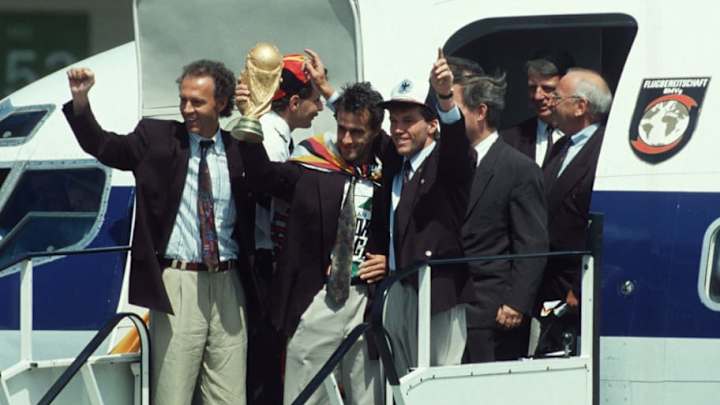
Germany's World Cup triumph in 2014 was their first as a unified nation. Mario Gotze struck deep into extra time against Argentina in Rio de Janeiro's iconic and historic Maracana to mark a key moment in the country's sporting history.
Three previous World Cup titles - 1954, 1974 and 1990 - had all come under the guise of West Germany, with a German nation split since the late 1940s after the fallout from the Second World War. An occupied and partitioned Germany had been banned from entering the 1950 World Cup qualifiers and the German Football Association was only reinstated after the tournament.
West Germany, the common name for Federal Republic of Germany - and still the official full name of unified Germany today - was created in May 1949. It was formed after the merging of the British and American occupied zones, but the Soviet Union held onto their chunk of German territory and so the communist German Democratic Republic, better known as East Germany, was also formed.
France briefly held onto their occupied territory, Saarland, whose own short lived national team was established and accepted into FIFA before West Germany or East Germany in June 1950. Saarland were actually in West Germany's 1954 World Cup qualifying group, before the territory was returned to German control in 1957 and reabsorbed into the German republic.
On the footballing front, the newly dubbed 'West' Germany played their first international following readmission to FIFA in November 1950, a 1-0 win over Switzerland in Stuttgart. 'East' Germany, meanwhile, established a football federation and a national team in 1951 and was granted full FIFA membership a year later. With Saarland, it meant that for a few short years in the 1950s there were actually three fully operational German national teams.
West Germany were the only one of the three to qualify for the 1954 World Cup, which they went on to win, beating a superb Hungary team led by Ferenc Puskas in a dramatic and famous final. They were subsequently a World Cup ever present, and equally never missed a European Championship after reaching their first continental tournament in 1972 for that matter.
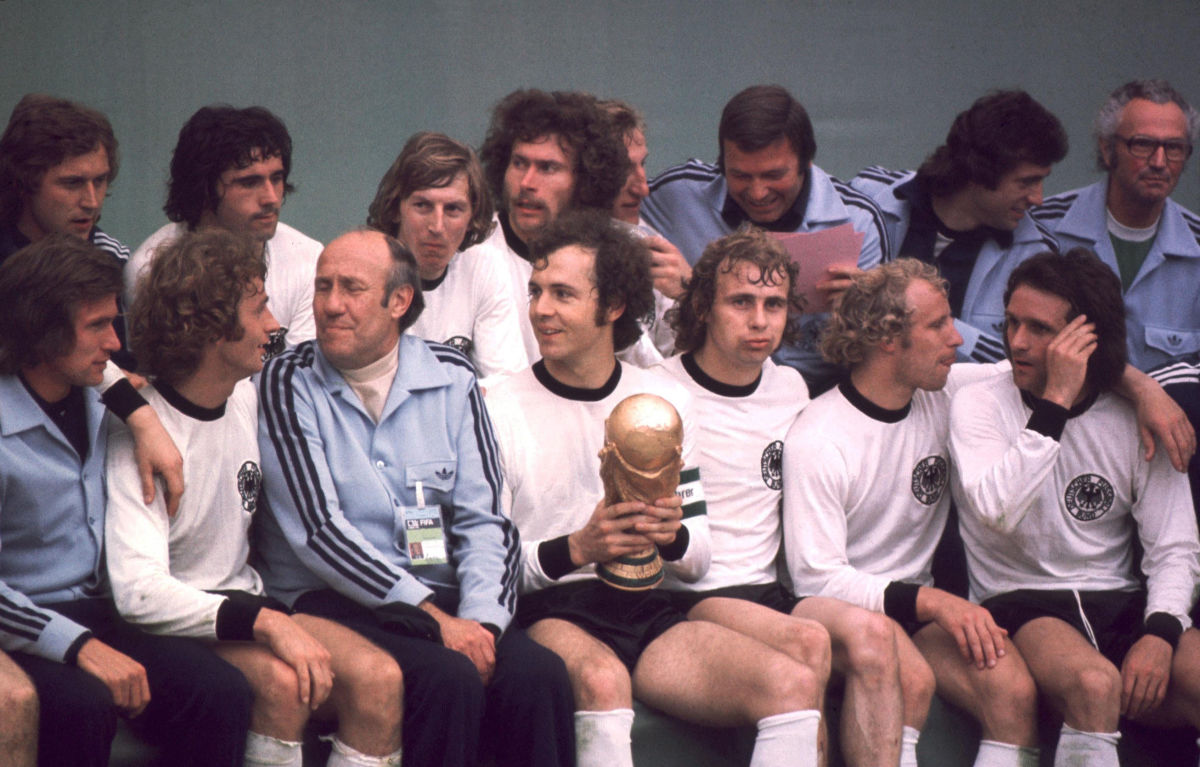
Saarland ceased to exist after only one World Cup cycle, while East Germany got to just a single World Cup during their 38-year history. That came on West German soil in 1974, the year of their capitalist neighbour's second global title. The East Germans never made it to a European Championship, although they did win medals in four consecutive Olympic games between 1964 and 1980, including gold in 1976, when communist nations dominated the amateur competition.
The greatest symbol of a divided Germany was the Berlin wall, built in 1961. With the city already separated into western and eastern halves along ideological lines, the wall physically split it. With Berlin located in East Germany, the western half of the city represented an enclave of West German territory. The city had therefore been a prime location for East German defectors to escape communism. As such the wall was erected with the purpose of stopping all such 'illegal' emigration out of East Germany. It was painfully effective.
With American forces operating in West Berlin and Soviets calling the shots on the communist side of the divide, this was the Cold War in full swing. The 1961 tank standoff at Checkpoint Charlie is one of the most infamous and iconic political images of the 20th century.
In 1961, American and Soviet tanks faced off at Checkpoint Charlie. The world watched with bated breath. Could this be the spark that triggered a nuclear war? #ColdWarhttps://t.co/qRAKPJX4eW pic.twitter.com/LxUzHxYFXR
— The Archive (@explore_archive) April 28, 2018
As the Cold War thawed in the 1980s, revolutions across Eastern Europe in 1989 led to the fall of communism. On 9th November 1989, the border crossings between east and west in Berlin were declared open. Demolition of the wall began as people began chipping away at it, claiming souvenirs and even creating holes big enough for new unofficial border crossings in some places.
The official dismantling by the East German military began on 13th June 1990, five days after that summer's World Cup had begun, and at last paving the way for German reunification.
West Germany had always been a world power on the footballing stage. After World Cup victory in 1954, albeit against the odds, the country's football fortunes blossomed. They reached a second final in 1966 and only a heroic Italian performance prevented the generation of Franz Beckenbauer and Gerd Muller competing against Pele's great Brazil side of 1970. West Germany of course then won on home soil in 1974, having already claimed the European Championship in 1972. They were only beaten on penalties in the Euro '76 final, before winning again in 1980.
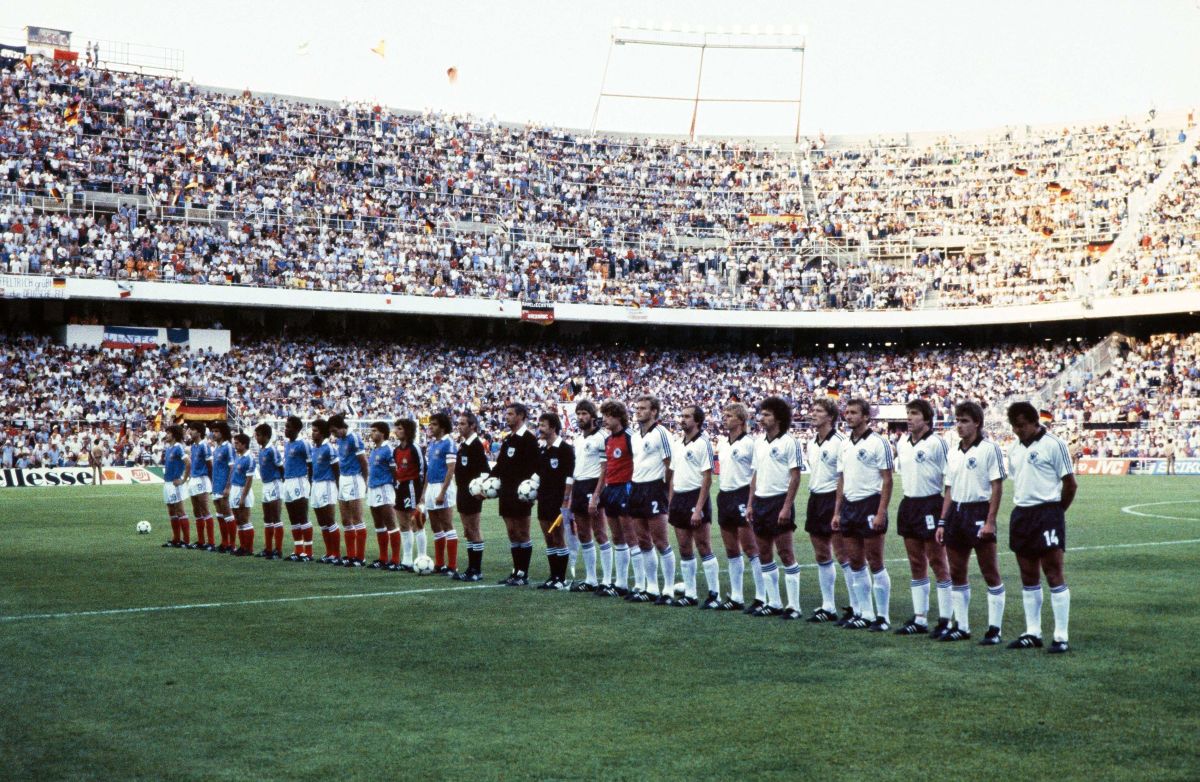
Further World Cup final appearances in 1982 and 1986, losing against Italy and Argentina respectively, only highlighted West Germany's consistent dominance and remarkable ability to navigate tournaments. By the late 1980s, Lothar Matthaus, who would win the Ballon d'Or after World Cup glory in 1990, Jurgen Klinsmann and Rudi Voller were the new stars.
West Germany easily navigated the group stage at Italia '90. In their first game, Matthaus, Klinsmann and Voller all scored to hammer Yugoslavia 4-1. The second game, played two days after official demolition of the Berlin Wall had begun, saw them go one better and beat UAE 5-1 - their three big stars all got on the scoresheet again.
The whole squad had only ever known a divided Germany, and only the oldest members could have been able to recall the Berlin Wall being built. It was an important time for every German.
Already safely through to the second round, the final group game against Colombia saw a late Pierre Littbarski goal cancelled out by an even later Freddy Rincon equaliser.
The Last 16 then yielded an infamously bad tempered clash between West Germany and their incredibly fierce rivals from the Netherlands. The game is most remembered for the altercation between Voller and Dutch defender Frank Rijkaard barely 20 minutes into the game, with the latter twice spitting in the former's hair and both players getting sent off. By his own admission, instigator Rijkaard had gone 'berserk' and later apologised.
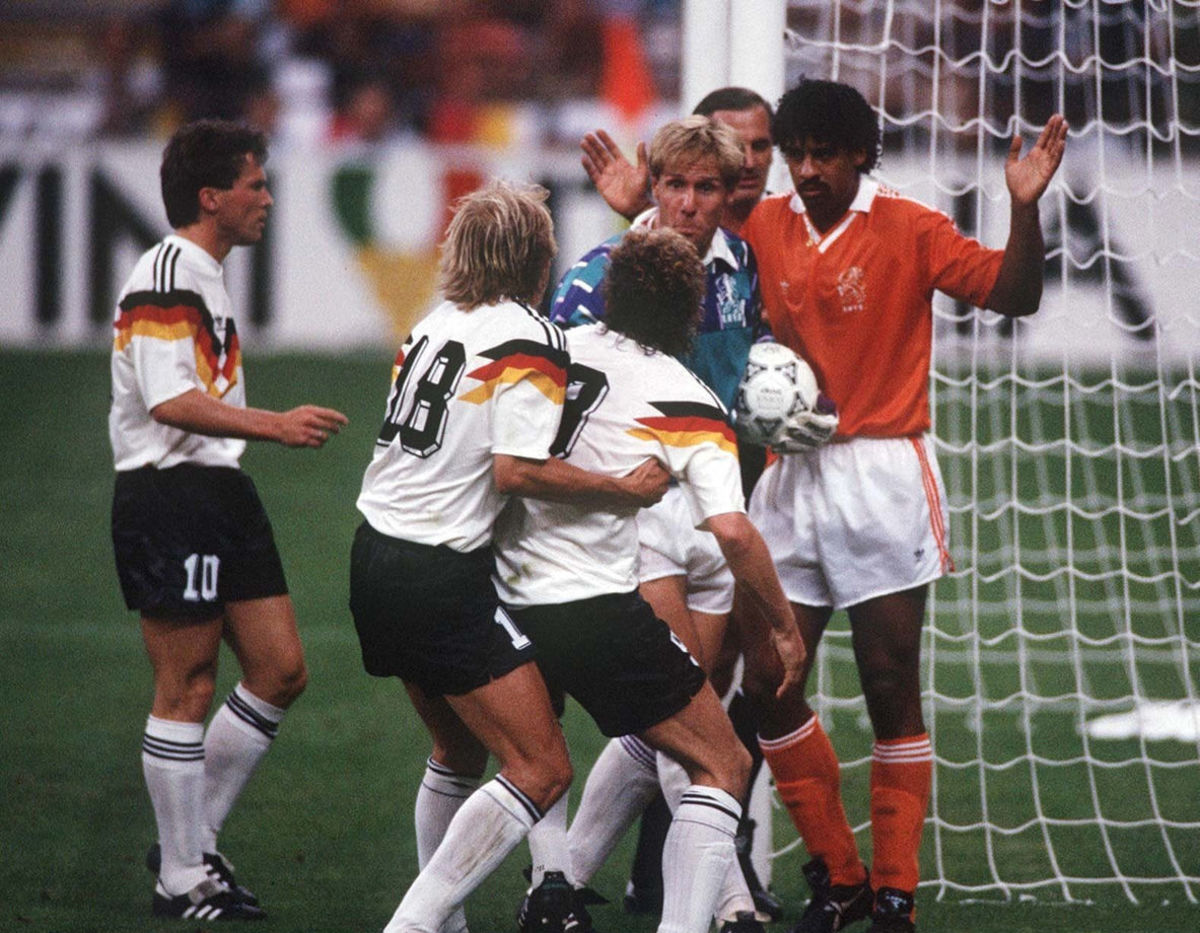
After things calmed down following the half-time interval, Klinsmann opened the scoring, before wing-back Andreas Brehme double the lead late on. An 89th minute penalty from Ronald Koeman proved to be no more than consolation as West Germany put out the reigning European champions.
Matthaus scored a first half penalty to get the better of Czechoslovakia in the quarter final in Milan, the only goal of the game, setting up a last four meeting with England. For the English, the semi final lives long in the memory, the tears from Paul Gascoigne, the deflected German goal, the persistent reminders of 'Two World Wars and One World Cup', the penalty heartbreak. It is one of football's great rivalries, but only as far as the English are concerned.
England and West Germany had hardly faced each in a meaningful game since 1970. As journalist and author Raphael Honigstein writes in 'Englischer Fussball: A German's View of Our Beautiful Game', the fact that it was England didn't really register with Germans.
4th July 1990 World Cup Semi Final, Turin. @England lose to W Germany. Terry Butcher consoles distraught teammate Paul Gascoigne #OnThisDay pic.twitter.com/Ev0ZuqyYFx
— Reach Licensing (@mirrorpix) July 4, 2017
'As far as [coach] Beckenbauer's 1990 side were concerned they had already won their particular grudge match - against the Dutch in the second round - and Italy's defeat by Argentina in the other semi final the night before had mercilessly ensured they wouldn't face their other bête noire,' Honigstein notes. 'The Turin game was just another semi final, their sixth in seven competitions.'
The final against Argentina, a repeat of four years earlier, was a tight affair. The 1986 showdown had been won 3-2 after the South Americans, having been 2-0 up, snatched a late winner. In 1990, it actually bore more resemblance to the 2014 final. Just as Mario Gotze scored deep into extra-time in the Maracana, it was Brehme who scored the solitary late goal in 1990, converting an 85th minute penalty to shatter Argentine hearts.
It was a third World Cup for West Germany, and the last as one half of a split nation.
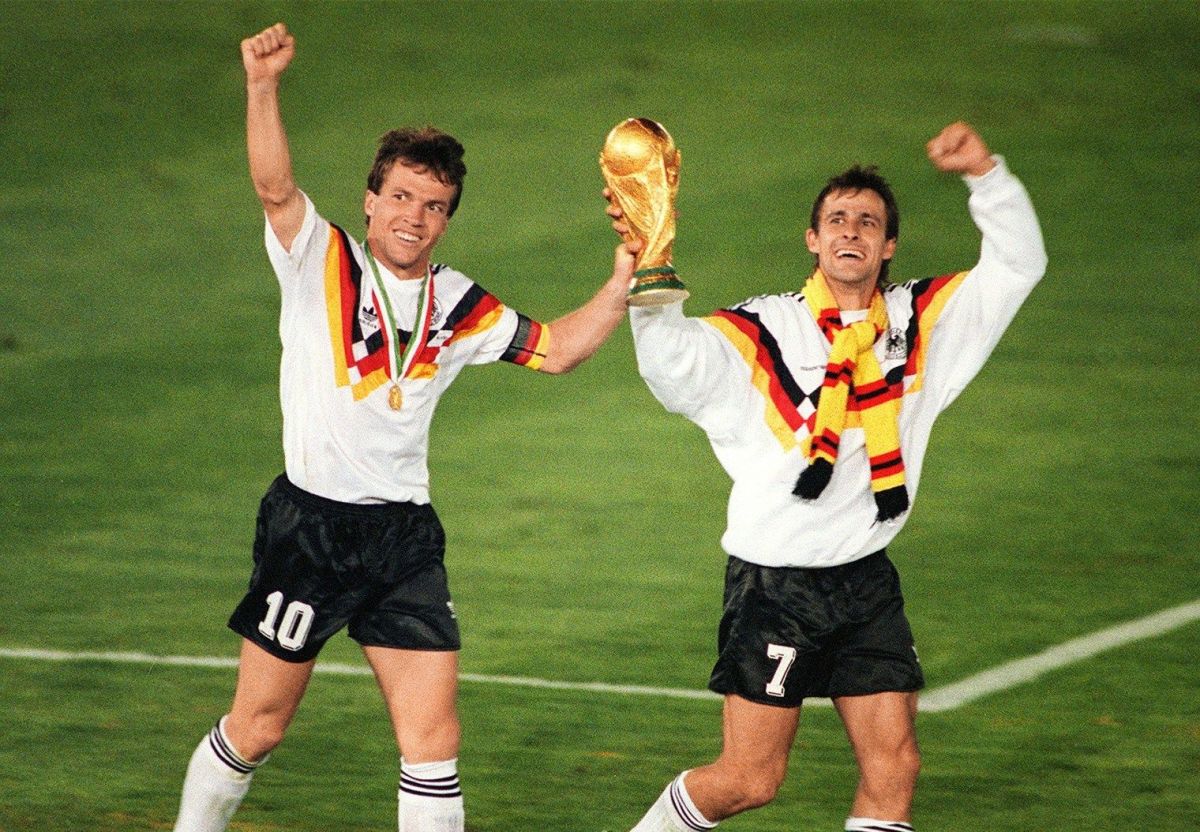
On 23rd August 1990, around six weeks after the World Cup final, the East German parliament voted through their accession into the Federal Republic of Germany. Negotiations between West and East had been ongoing since July, and reunification was completed on 3rd October as East Germany was officially absorbed into the West to become a single nation for the first time since 1945.
As far as the football was concerned, there were still one or two things that needed straightening out. West Germany and East Germany had already been drawn together for Euro '92 qualifying, but the dissolution of the East German team resulted in the five-team group being cut to four. Germany, of course, topped it to reach the final tournament.
The reunification also bolstered the German squad. Matthias Sammer, future Ballon d'Or winner in 1996, and top striker Ulf Kirsten were among those who joined up with the 1990 World Cup winners, going on to claim the title Euro '96, their first ever silverware as a unified team and nation.
